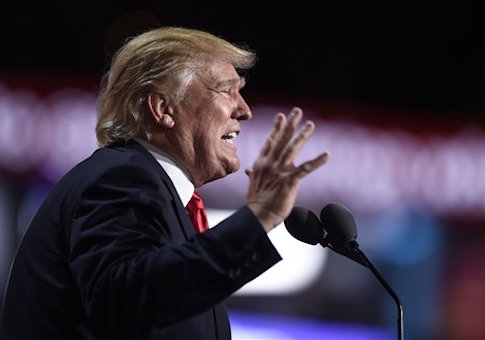CLEVELAND, Ohio—Donald Trump formally accepted the Republican nomination for president on Thursday night, declaring "Americanism, not globalism" would be his credo should he win the presidency.
Trump described an America in crisis and positioned himself as a leader who will restore "law and order" to the country during his remarks on the final evening of a chaotic Republican National Convention. He also said that we need to "abandon the failed policy of nation-building and regime change" abroad and ensure that countries who we help defend "pay their fair share."
"Americanism, not globalism, will be our credo. As long as we are led by politicians who will not put America First, then we can be assured that other nations will not treat America with respect. This will all change in 2017," Trump said, taking a decidedly nationalist tone as chants of "USA! USA! USA!" sporadically broke out in the convention hall.
"The American people will come first once again. My plan will begin with safety at home—which means safe neighborhoods, secure borders, and protection from terrorism. There can be no prosperity without law and order," Trump continued.
Trump highlighted the increase in homicides and police killings in American cities, and spoke of the threat posed by illegal immigrants with criminal records living in the United States. He also focused on the persisting high unemployment rates for certain communities and the growing national debt, and promised to enact economic reform. He pledged to renegotiate "bad trade deals" such as the North American Free Trade Agreement, or NATFA, leaving the door open to walk away from the deal if he’s not satisfied with the results.
Trump gave attention to the Obama administration’s foreign policy blunders that he said have produced "one international humiliation after another," specifically faulting Hillary Clinton, formerly the secretary of state, for America’s global mistakes.
"After fifteen years of wars in the Middle East, after trillions of dollars spent and thousands of lives lost, the situation is worse than it has ever been before. This is the legacy of Hillary Clinton: death, destruction, terrorism, and weakness," Trump said.
"But Hillary Clinton’s legacy does not have to be America’s legacy. The problems we face now—poverty and violence at home, war and destruction abroad—will last only as long as we continue relying on the same politicians who created them."
A draft of the candidate’s speech was leaked online earlier Thursday, reportedly by a pro-Hillary Clinton Super PAC that obtained the remarks and others prepared for delivery from a "Republican source" with access to the document. Trump’s speech diverted only slightly from the leaked remarks.
Trump was introduced Thursday night by his daughter Ivanka, who was well received by the crowd. She described her father as "the people’s champion" and insisted that he would "fight for equal pay for equal work," which prompted questions for reflecting a talking point typically used by Democrats.
The Trump campaign has been embroiled in controversy for days, beginning with Melania Trump’s plagiarism of Michelle Obama’s 2008 remarks at the Democratic National Convention.
Trump has also come under fire during the convention after telling the New York Times in an interview published Wednesday that he would only be guaranteed to provide immediate military aid to a NATO member country invaded by Russia if the nation had fulfilled its defense spending obligations to the alliance. Several Republican lawmakers criticized Trump for the suggestion.
"The GOP nominee for president is essentially telling Russians/other bad actors the U.S. is not fully committed to supporting NATO alliance," Sen. Lindsey Graham (R., S.C.), who ran against Trump in the Republican primary, wrote on Twitter. "Statements like these make the world more dangerous and the United States less safe."
Trump, whose unconventional views on foreign policy and other matters have alienated some in the party, was dealt a blow on Wednesday when Sen. Ted Cruz (R., Texas), his chief competitor in the primary, declined to formally endorse him during primetime remarks. Instead, Cruz urged his audience to "vote your conscience," drawing ire from party officials and Trump loyalists.
Trump’s policies drew praise from the litany of speakers on Thursday evening.
Peter Thiel, the co-founder of PayPal, praised Trump for his focus on domestic issues and plan to turn away from "the era of stupid wars."
"Instead of going to Mars, we have invaded the Middle East. We don’t need to see Hillary Clinton’s deleted emails: her incompetence is in plain sight. She pushed for a war in Libya, and today it’s a training ground for ISIS. On this most important issue, Donald Trump is right. It’s time to end the era of stupid wars and rebuild our country," Thiel said.
The Republican National Committee has tried to unite the party around Trump since he captured the number of delegates necessary to win the nomination in May. During the final night of remarks, themed "Make America One Again," RNC Chairman Reince Priebus urged the audience to "stand united as Republicans" and elect Trump to the White House over Clinton, who will be formally nominated by the Democrats next week.
Priebus positioned Trump’s foreign policy as favorable to that of Clinton, saying, "In foreign policy, a Clinton presidency means forgetting our friends and enabling our enemies."
Trump’s official acceptance of the nomination on Thursday came days after dissenting delegates unsuccessfully attempted to force a recorded vote on convention rules, which could have allowed them to cast their votes for a candidate other than the business mogul.
